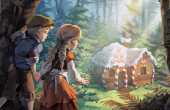Sarai Mannolini-Winwood
Sarai is a free-lance literature enthusiast who currently works as an academic. An avid horror and fantasy reader she is an advocate for its cultural importance.
Columnist I
- Plebian Penman
- Common Writer
- Aristocratic Author
- Lurker
- Pssst
- Hand Raiser
- Vocal
- Outspoken
- Extrovert
- Sharp-Eyed Citizen
- Town Watch
- Detective Deskman
- Penman Patrol
- Actor
- Well Read
- Punctuator
- Article of the Month
- ?
- Articles
15 - Featured
15 - Comments
207
- Ext. Comments
175 - Processed
78 - Revisions
74
- Topics
61 - Topics Taken
8 - Notes
105
- Topics Proc.
336 - Topics Rev.
37
- Points
8472 - Rank
7 - Score
4848
Latest Articles
Latest Topics
Biographical truth or the real heart of the story?'Dickinson' is the Apple TV series 2019-2021 about American poet Emily Dickinson. The premise (taken from Anreeva & Pelski 2018) is that Dickinson takes place "during Emily Dickinson's era with a modern sensibility and tone. It takes viewers into the world of Emily, audaciously exploring the constraints of society, gender, and family from the perspective of a budding writer who doesn't fit in to her own time through her imaginative point of view. Dickinson is Emily's coming-of-age story – one woman's fight to get her voice heard." The best word there is audaciously – the series makes direct use of Dickinson's actual poetry throughout the series to theme the episodes and to add to a story about a complex poet. Biographies on Dickinson indicate she was an isolated, eccentric and (reading between the lines) anxious woman in a period of relatively large gender, race and class oppression. Little of her poetry was actually published through her life, and most information about her is based on her prolific letter writing. It is easy to see through the series that they have taken great liberties with both her character and her life…but is this a problem? The show itself heavily highlights the oppressive period she lived during and her struggles as a poet and a woman. Many of the themes and topics are ones that resonate with young women today – about finding self, about morality, about understanding life and love and friendship. It would be interesting to explore this topic in more depth: is there value in taking liberties with a real person's life and works if it still serves the message or purpose of their story? Can a fictional biography be as meaningful to the contemporary viewer as a real biography? Or is this a betrayal of a woman who suffered enough during her own time?
|
Social and television topic changes over time as seen through the lens of Star TrekStar Trek the television series first debuted in 1966 as what is dubbed 'The Original Series' during which the costuming, role allocation and even ethical storytelling both reflected the socio-cultural context of USA, but also challenged and invited complex discussions about morality, ethics and rights. It, and the following original series, walked a fine line of being commercial enough to appeal to audiences as well as being true to the Science-Fiction genre in that it needed to engage in deep discussions about what it means to "be." 'Enterprise' was the last of the original broadcasts ending in 2005 before the success of the film "reboot" in 2009. The 2009 film 'Star Trek' reinforced a number of stereotypes and cliches that were disappointingly lacking in the nuance of the original series, and for a moment it seemed it was finished with again. Then came the new television revival with 'Star Trek: Discovery' that not only again reflected the excitement and challenges of space exploration, but also touched on the same socio-cultural concerns current in contemporary society. It was a show that began to speak about issues we face in our own world. From here spanned out a range of new shows from 'Picard' to 'Lower Decks' that each began to broaden the world of Star Trek, but also found new ways to engage in important conversations. An article looking at the different discussions, topics and socio-cultural confirmations and challenges across the timeline of Star Trek would be fascinating. It is one of very few shows to have spanned such a large period of time on television that has not simply reflected back social norms. I would be interested to see a deeper analysis of this topic. |
A new FoundationThe new TV show 'Foundation' from Apple is an imagining of Isaac Asimov's novella series of the same name. With an initial two episode drop the show has already received mixed reviews. As always it is difficult to deal with any type of adaptation. There will always be those for whom the original material, and their personal experience with it, cannot be eclipsed. However, the point of adaptations is to allow a re-imagining of source material within the context of the period it is re-produced in. Even the nay-sayers have to admit this depiction of the fall of a great Empire, corrupt and dystopic, underpinned by a focus on a 'genetic legacy' that infers an extreme type of nepotism, is as extremely relevant in message and content today as it was when Asimov wrote it. Already in two episodes the show has raised a myriad of questions about religion, politics, and technology that have contemporary value. A discussion of the original work and its social connections, which is then compared to the changes made in the show that reflect the social concerns of today, would be a valuable discussion to have. It would be interesting to examine the changes made by the showrunners, and how that fits within the socio-political and technological landscape of today.
|
Moral choices in Resident AlienTV show 'Resident Alien' is new this year from Sci-fi. The premise concerns an alien who crashes to Earth in a remote Colorado mountain town and assumes the identity of the town doctor. The TV show on the surface is a wacky comedy-drama about an alien trying to pass as human and engaging in a variety of ridiculous endeavours, including a war with a 9 year old who sees through his from. BIG SPOILERS: QUESTION (Safe to read again):
|
Is Queen Latifah Equalizing racism in her new show?The Equalizer is a new to TV series from CBS starring Queen Latifah. The choice made in the lead and the messages within the stories tend to focus on racial experiences in USA are really important conversations to be had. However, there needs to be an exploration of the balance present: how well is the show representing equality and experience in America? How is gender and race explored? How does the show add to the conversations around Black Lives Matter and racial tensions in the USA? A discussion could also be made to examine how this genre of spy/crime tropes have been developed since the original and if this is contributing to wider concepts of new storytelling. |
Is the new Charmed having all the important conversations?'Charmed' a reboot of the late 90s show was released in 2019 with a new cast, new plot lines but also a lot of overlap in narrative, mythos and setting. The story is of three sisters who are witches with the special "power of three." The first big difference is the move from three visually "white" American actors to three mixed-heritage women representing Hispanic and Black American culture. The show also introduces the white-lighter as head of Women's Studies (a controversial cis-male), a lesbian relationship, a 28 year old virgin and a stereotypical teen wanting to join the Greek systems at her college. From the start the line up is unusual and (from my perspective) wonderful. But is this a deep engagement with the important conversations that need to be happening, or is this simply a response to popular culture and trending? |
Warrior nuns...really?A bizarre name that can as easily put you off as draw you in – 'Warrior Nun' (WN) is the latest TV series from Netflix. It is based, unsurprisingly, on a comic book character by Ben Dunn. It tells the story of a young woman who is reincarnated by an angel's halo during an attack by demons on a sect of warrior nuns. The presence of the halo in her body, when the previous Warrior Nun died gives her abilities and a new life. Sounds ridiculous right? The show is worth a deeper analysis both for the development of themes and ideas that are reflecting changing perspectives on gender, race and religion, but also from the perspective of wider changes that are being reflected through the stable of shows from Netflix and other show providers. What do you think?
|
Star Trek: The commitment to storytellingAt the time I loved the new Star Trek movies. They were exciting, full of space travel, linked to nostalgia and full of "larger than life" characters. However, a re-watch of these was almost as painful as re-watching the Fast and the Furious series; instead of vivid I realised the characters were one-dimensional, stereotyped, almost all white and when I actually took note of the ridiculous 70s dresses of the women, actually quite insulting. Now this realisation did not occur randomly, this was the result of returning to re-watch the films after completing the TV series Star Trek Discovery – and what I discovered was that the films lived up to the franchise (hated by fans, full of over blown situations and lacking the depth of storytelling in the shows). Now with the launch of Star Trek Picard I am blown away by the commitment to storytelling in both the shows. The focus is on personal growth, the difficulty of sticking to your convictions, taking responsibility for your actions, understanding the complexity of dealing with people (human and alien) and it is committed to showing diversity. I think there is a lot in the new Star Treks that is showing the way forward for all TV – in a post MeToo world, in a post Black Panther world, it is not acceptable to continue to show narrow stereotyped, outdated and offensive perspectives. We often talk about the power of pop-culture and mainstream entertainment because it does offer a platform to not only reflect the world, but offer paths to change. This is a lot of lauding and pressure to place on a set of sci-fi TV shows, but I think Star Trek has more to teach us, even if it is just a better commitment to storytelling. What do you think? |
Latest Comments
| Writing About Place | |
Thanks for sharing the discussion, not a trope I knew much about so appreciate the clear outline with great examples – really useful! | The Manic Pixie Dream Girl: Manipulative or Unrealistic? |
A really interesting discussion that unpacks it in an easy to read way – great considering how messy multiverse discussions can get! I like that you bring this back to the larger concept of personal responsibility 🙂 | Marvel Movies and the Multiverse: Different Worlds, Same People |
A really fascinating deep dive examination – thanks for sharing this great read with us. | The Ambiguous Morality of Œdipus Rex’s Iocastê |
Thanks for sharing that Emily – I will check it out 🙂 | Writing About Place |
A great discussion and it was an amazing soundtrack! Thanks for sharing. | How Stranger Things' Most Important Licensed Songs Compliment Its Story |
A great read, thank you. I do consider that Bridgeton is using the Regency as a set dressing rather than actually being a historical romance text. It says more about our context today than the actual period it is “set” in – and I love it for this! | Bridgerton's Reimagining of Regency Society |
Great article – a wonderful morning read. Plus must say loved the new HP2 for some great witch positive perspectives. | Inside America's Fascination with Witches |







In a way I don’t think the approach is too different to writing fiction in a real place, you would disregard any of the advice that indicates an imagining but the same principles should be the same.
One thing that I am engaged in currently is a geocritical review of a real place, and this means not only am I going there and capturing lived experience, I am also engaging with what is already written about that place. For real NF this would be looking at historical documents, local websites and tourist sites, local papers etc. that help capture a sense of how the place has changed and how it is used.
I hope that helps a little 🙂